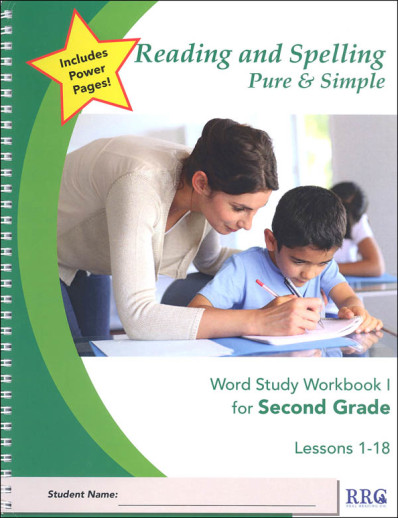We use cookies to make your experience better. To comply with the new e-Privacy directive, we need to ask for your consent to set the cookies. Learn more.
Reading & Spelling Pure & Simple Second Grade Word Study Workbook I (Lessons 1-18)
Word Study Workbook I for Second Grade, Lessons 1-18 introduces and practices the basic sounds of all 26 letters of the alphabet as well as a second pronunciation for the consonant spelling s (ss), |s| and |z| (gas, miss, as, his), the digraph ck and trigraph cks (pack, packs), and comparing cks to x. Workbook is consumable and about 115 pages, pb. There are several exercises for each lesson: Read. Discuss, Spell (Ex 1); Rhyme These Words (Ex 2); Word Study (Ex 3); ABC Order (Ex 4); and Guide Words in the Dictionary (Ex 5).
Students will learn to read, spell, and understand most of the vowel and consonant sounds, including digraphs and trigraphs. Also introduced and practiced are prefixes, suffixes, several word endings, and more vowel and consonant variations as well as the schwa spellings and homonyms and homophones. Each of these four Word Study Workbooks (I-IV) basically follow the same format consisting of five exercises per lesson. Pairing words that rhyme is sometimes replaced with abbreviations and syllabication. Completing these four books will place a student well on his or her way to skilled reading.
The first exercise Read, Discuss, Spell presents a list of words to learn:
* The Read has the students read the words out loud to the teacher. Students discover that reading simply involves recognizing the letters of a word and knowing the sounds they make, then pronouncing these sounds from left to right.
* The Discuss components call for the teacher to chat with students about word meanings (no formal definitions needed) and make students aware that many English words have several meanings (bat, lap). This activity of discussing words ensures that students will develop the habit of thinking about meaning while they read.
* The Spelling part consists of a spelling test given at the end of every Exercise 1.
The other four exercises reinforce concepts taught in Exercise 1 and involve
* pairing words that rhyme, dividing words into syllables, or matching abbreviations,
* putting words from a list in alphabetical order,
* word study vocabulary building, and
* dictionary work
These workbooks provide for small group (centers and reading groups), one-on-one instruction, interaction with the entire class, and really help students start out as confident, authentic readers. Teachers using this curriculum have been pleased by the dramatic improvement their students have shown when tested by reading programs such as Fountas and Pinnell, Scholastic Reading Inventory (SRI), and computer programs including iStation and Read 180.
Word Study Workbook I introduces and practices the basic sounds of all 26 letters of the alphabet. Also introduced and practiced is a second pronunciation for the consonant spelling s (ss),|s| and |z| (gas, miss, as, his), the digraph ck and trigraph cks (pack, packs), and the comparing of cks to x (socks, box). Two-syllable challenge words continue to be included.
The Reading and Spelling Pure & Simple program's no-nonsense presentation without distracting graphics means these lessons will work as well with remedial students as they will with young students. The lessons teach letter and sound patterns and students learn to associate alphabet letters and letter combinations with their assigned sounds. Concepts are explained in terms of “patterns” rather than “rules,” and spelling and word comprehension are emphasized throughout the program. This systematic, sequential method is simple for anyone to understand and teach. One-page directions provide the instructions for teaching each easy-to-follow lesson. Teacher preparation is kept to a minimum - read word lists, discuss word meanings, spell the words in every lesson, and keep track of the student’s progress. Designed for one-on-one instruction, it can be used by itself or coupled with Workbooks for review and practice.
The optional, consumable Workbooks are grade specific in the lower grades but can be used sequentially in the upper grades (or with remedial or ELL students). There are four exercises for each lesson: Read, Discuss, Spell (Exercise 1); Rhyme These Words (Exercise 2); Word Study (Exercise 3); ABC Order (Exercise 4); and Guide Words in the Dictionary (Exercise 5). There is some overlap in lesson coverage between the workbooks with lessons covered at different grade levels having similar but age-appropriate activities.
| Product Format: | Paperback |
|---|---|
| Grade: | 2 |
| Brand: | Real Reading Company |
| ISBN: | 9781949119312 |
| Length in Inches: | 11 |
| Width in Inches: | 8.75 |
| Height in Inches: | 0.5 |
| Weight in Pounds: | 0.7 |
Be the first to review this item

